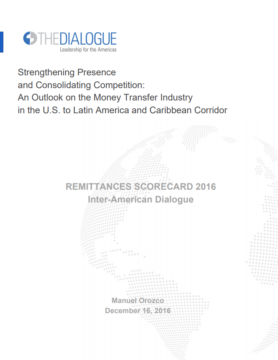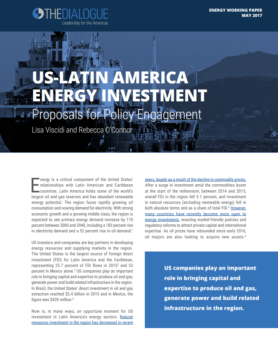
Natural Gas Market Outlook
Given their close proximity to the United States, LAC countries are well-positioned to capitalize on the surplus of US gas exports and current buyer’s market.
A Daily Publication of The Dialogue
Q: In a recently released report, British consulting firm Randall Mills said the Caribbean Community regional block, or Caricom, "could expire slowly over the next few years." The Caribbean integration movement could come to an end in four to five years because of poor financing, dissatisfaction among members and the world economic crisis, the report added. Is Caricom in danger of collapsing? What effect would such a collapse have on the economies of Caribbean countries in the short and long term? What are Caricom's greatest achievements thus far? Could closer integration benefit the region and, if so, what steps would have to be taken to achieve it?
A: Ivelaw Lloyd Griffith, professor of political science, provost and senior vice president of York College of The City University of New York: "Close observers of the Caribbean know that, for the past few years, Caricom's political and bureaucratic leaders have been practicing the science of muddling through. Thus, it was not entirely surprising that reports on the integration movement examined when Caricom heads met in Paramaribo earlier this month portend not just danger but possible collapse. The reports are prompting a rethinking about regional integration policy and practice, and leaders will ponder a five-year strategic plan when they meet in St. Lucia this July. These pursuits call to mind a prescient remark by British statesman Anthony Eden made during the 1930s: 'there is nothing more dangerous than a foreign policy based on unreality.' Put simply: do a reality check before you make or recalibrate policy, in this case integration policy. Leaders should be mindful of at least two realities in doing their reality check. First, as much as some of them would prefer to believe otherwise, the core challenge is not secretariat management, but rather political leadership. The diffidence by most leaders regarding the Caribbean Court of Justice-including by Trinidad and Tobago where the court is based-is one manifestation of this. Second, some Caribbean states cannot survive without integration; globalization's turbulence is too powerful, and survival assistance from erstwhile colonial masters or the United States is not guaranteed, as they have their own challenges. Thus, Caribbean leaders need to jettison their national sovereignty sensibilities and salvage the integration survival ship. Buoyancy is not just desirable, it's necessary."
A: Norman Girvan, professor emeritus of the University of the West Indies: "The danger is real. The report points out that the secretariat and other regional institutions are struggling to make ends meet, with governments unwilling or unable to come up with more money or to pay their contributions on time. This is blamed on falling revenues and rising debts due to the fallout from the global economic crisis, and hopes of a recovery are vanishing. But lagging contributions are also a sign of the malaise in the integration movement. After more than 20 years of trying, Caricom has been unable to complete its 'Single Market and Economy.' Caricom's intraregional trade is less than 15 percent of its foreign trade, and one country-oil-rich Trinidad and Tobago-dominates the regional market. The other 14 member countries hardly depend on the regional market, so a collapse of Caricom would not make much of a difference to their economies. The free-trade arrangement would probably continue anyway. The simple fact is that the neoliberal approach to economic integration has not worked. Caricom's greatest success has been in functional cooperation, in areas like health, education, security and disaster management. These projects are donor-funded and largely donor-driven. Economically, Caricom could benefit its members by collaborating in organizing the supply of regional public goods in food security, renewable energy, transport and climate change adaptation. But political leaders are unwilling to transfer any national sovereignty to the regional center; unlike the European Union. Meanwhile larger configurations like UNASUR, ALBA and CELAC are forging ahead; and Caricom members are being drawn into their orbit."
A: Richard L. Bernal, executive director for the Caribbean in the Inter-American Development Bank: "Caricom is not in danger of collapse because of member states' commitment to the integration process. The regional integration process is experiencing a difficult period given a combination of perennial issues of sustainable financing and the need to review the institutional arrangements for governance and the constraining consequences of the global economic crisis. The major achievements of the 40-year-old continuous integration process are in regional cooperation and, to a lesser extent, in regional economic integration. The region can benefit from a re-dimensioning and deepening of integration towards a seamless regional economic space. This will require a redesign of the model and modalities of regional economic integration accompanied by an appropriate governance structure."
A: G. Philip Hughes, senior director at the White House Writers Group and former ambassador to Barbados and the Eastern Caribbean: "The Randall Mills report warning of the potential for the collapse of the Caribbean integration movement is a bit puzzling. Assuming the report was done for Caricom itself-since consulting firms don't opine on such things without a client-it could well represent a bit of Caricom budget gamesmanship with its member governments, an appeal for more funds and senior-level attention for Caricom under the threat of the public failure of regional integration efforts in which governments are politically invested. Experience shows that there will always be Caribbean integration efforts as long as a modern Caribbean of independent states exists. These efforts date back to the West Indies Federation-and even the colonial powers struggled with the most effective ways to organize and administer their Caribbean possessions. Each Caribbean nation is too small-especially now in a world of China- and India-sized economies-and their problems are too similar to forgo integration efforts, whether under Caricom or some other rubric. The real question is: Which integration efforts, and of what type, bring the Caribbean the greatest dividends? In recent years, Caribbean leaders have been attracted to 'big' integration projects, like the Single Market and Economy and to creating new and broader structures like the Association of Caribbean States. They've also been drawn to new Latin American regional groupings like the Community of Latin American and Caribbean States, conspicuous in their exclusion of the United States and Canada, two of the nations most economically important to the Caribbean. Often, humbler and less headline-grabbing areas of technical cooperation-in health, telecommunications, standards setting and regulatory harmonization and the like-afford the biggest near-term gains for Caribbean citizens and, sometimes, for Caribbean economies."
A: Paget deFreitas, editor of overseas publications for the Jamaica Gleaner: "Caricom is ailing, but rumors of the community's imminent death are greatly exaggerated. It may, however, remain weak and febrile for quite a while yet. First, the community's major ailment that has long weakened public confidence in it is Caricom's failure at an economic breakthrough-the proof in people's lives that there is logic to integration; that the economic product of the community is greater than the sum of its individual parts. The current global crisis aggravates Caricom's condition. Aside from the penury of most of its members, the major cause of Caricom's problems is well-known, what its critics call its implementation deficit. It fails to follow through on its decisions, such as the free movement of labor to complement that of capital. This is an inherent weakness of the structure of the organization, with its absence of a strong center to which the partners cede some executive authority and share sovereignty. Ultimately, fixing Caricom rests with Jamaica, its economic leader, and Trinidad and Tobago, the strongest member economically. Both countries, ironically, would have the most to lose from the demise of the community, though they have the greatest fear of shared sovereignty. Caricom's collapse and a retreat from the proposed single market or common market could, for instance, put at risk more than $1 billion of Trinidadian exports to Jamaica annually and one platform on which Jamaica stands in punching diplomatically above its weight. Cries of 'federation through the backdoor' make potent politics. Trinidad and Tobago, with its relative wealth, harbors Jamaica's fear of 50 years ago of being descended on by the hordes, which, to a degree, is complicated by the politics of ethnicity."
Given their close proximity to the United States, LAC countries are well-positioned to capitalize on the surplus of US gas exports and current buyer’s market.
In its fourth edition, the Remittances Scorecard ranks 30 companies working in 11 Latin American and Caribbean countries. It evaluates them across 12 indicators to assess their performance and competition in the money transfer industry.
While the Trump administration’s “America first” policies are aimed primarily at giving higher priority to national security and economic growth for the United States, the White House’s approach will have impacts on energy relations with the rest of the hemisphere that should also be considered.

